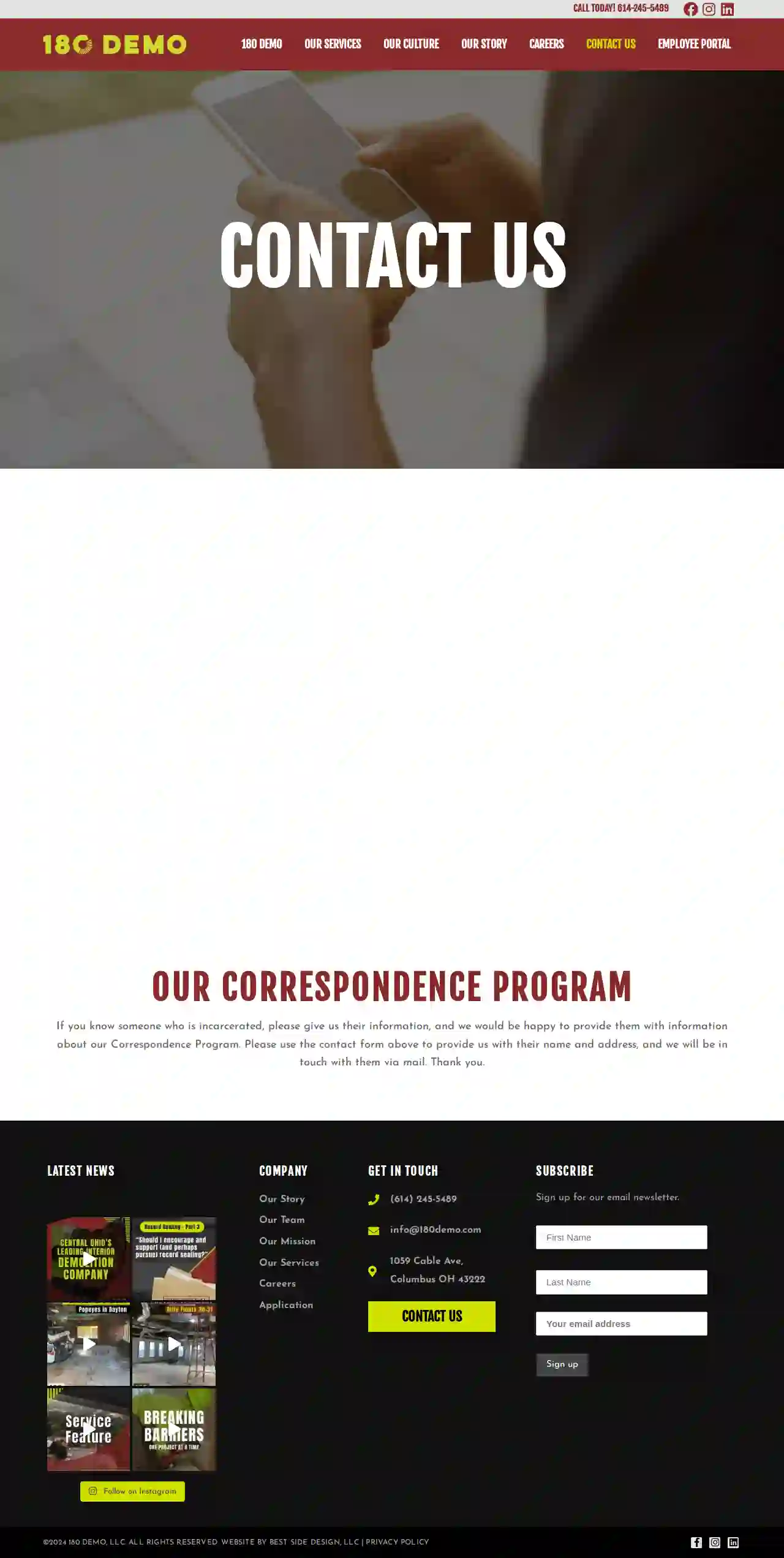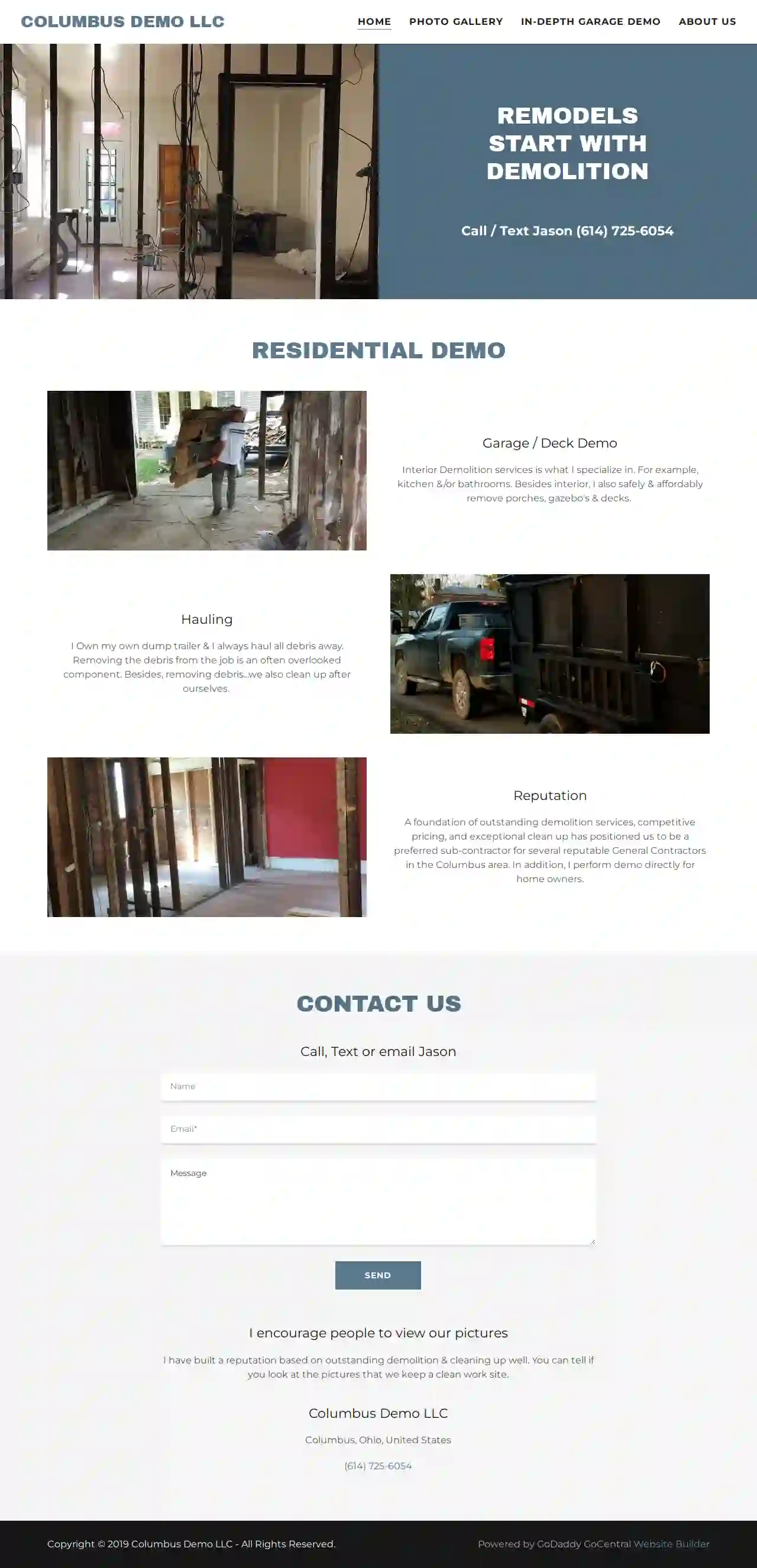Construction Companies Columbus
Find Construction Services in Columbus
Get up to 3 Construction Company quotes for your project today! Compare profiles, reviews, accreditations, portfolio, etc... and choose the best deal.
OUR MISSION To provide general contractors with the highest level of professionalism, safety, and reliability as their demolition provider. We are creating supportive employment opportunities to prove that taking new directions is always possible regardless of a person’s past. OUR VISION WATCH: WHAT WE'RE ALL ABOUT OUR CORE VALUES SAFETY ResponsiblePreparedAware INTEGRITY HonestTrustworthyReliable COACHABILITY HumbleReceptiveCurious RESILIENCE DeterminedFaithfulFocused RELATIONSHIPS EmpatheticResponsiveCooperative PROFESSIONAL TrainedEquippedCompetent OUR TEAM JOHN RUSH FOUNDER/CEO CARL SHYE CHIEF FINANCIAL OFFICER AMBER SHOUP DIRECTOR OF HUMAN RESOURCES MATTHEW LANDEFELD LEAD ESTIMATOR ADAM DAMRON ESTIMATOR JOHN RUSH, JR. DIRECTOR OF OPERATIONS KENNETH MONTGOMERY FOREMAN ROBERT VANDERDOES FOREMAN MARQUISE MCCABE FOREMAN FILBERTO RODRIGUEZ FOREMAN JEREMY PRESTON FOREMAN MATTHEW WATTS FOREMAN TANK JONES FOREMAN MORE ABOUT A CAREER WITH US If you know someone who is incarcerated, please give us their information, and we would be happy to provide them with information about our Correspondence Program.Click here to contact us with their name and address, and we will be in touch with them via mail.
- Services
- Why Us?
- Our Team
- Gallery
- Services
- Why Us?
- Services
- Why Us?
- Services
- Why Us?
- CoColumbus, US
- Services
- Why Us?
- Services
- Why Us?
- CrColumbus, US
- Services
- Why Us?
Over 8,502+ Demolition Businesses registered
Our demolition experts operate in Columbus & surrounding areas!
DemolitionMatch has curated and vetted Top Demolition Contractors arround Columbus. Find a top & trustworthy contractor today.
Frequently Asked Questions About Construction Companies
- Hiring Qualified Contractors: Choose construction companies with strong safety records and established safety programs.
- Site Safety Planning: Develop a comprehensive site safety plan that outlines safety procedures, hazard identification, and emergency response protocols.
- Personal Protective Equipment (PPE): Require all workers to wear appropriate PPE, such as hard hats, safety glasses, gloves, and high-visibility vests.
- Training and Education: Ensure workers receive adequate training on safety procedures, hazard recognition, and the use of PPE.
- Regular Inspections: Conduct frequent site safety inspections to identify and address potential hazards promptly.
- Incident Reporting: Establish a clear process for reporting and investigating accidents or near-misses to prevent recurrence.
- Communication and Collaboration: Foster open communication and collaboration between the project owner, contractor, and workers to create a culture of safety.
- Poor Planning: Failing to adequately define the project scope, create a detailed budget, or establish a realistic timeline.
- Skipping Permits: Attempting to bypass the permitting process, which can lead to fines, delays, and potential safety hazards.
- Hiring the Cheapest Contractor: Choosing a contractor solely based on the lowest bid without considering their experience, reputation, and insurance coverage.
- Lack of Communication: Failing to establish clear communication channels between the project owner, architect, and contractor, leading to misunderstandings and delays.
- Unrealistic Expectations: Setting unrealistic expectations for the project's timeline, budget, or quality, which can lead to disappointment and disputes.
- Ignoring Change Orders: Failing to document and approve changes to the scope of work, which can result in cost overruns and project delays.
- Cutting Corners on Quality: Using inferior materials or rushing construction to save money, which can compromise the durability, safety, and value of the project.
- Scope of Work: A detailed description of the construction work to be performed.
- Project Schedule: The timeline for completion, including key milestones and deadlines.
- Payment Terms: The agreed-upon payment schedule, including any deposits, progress payments, and final payment.
- Change Orders: A process for handling changes to the scope of work or project schedule.
- Warranties: Guarantees provided by the contractor on materials and workmanship.
- Dispute Resolution: Procedures for resolving disagreements between the parties.
- Document the Defects: Take photos and videos of the defects, noting their location, severity, and any relevant details.
- Contact the Contractor: Notify the construction company in writing about the defects, providing detailed descriptions and documentation.
- Review the Warranty: Check the warranty documents to determine the coverage for the specific defects and the timeframes for making claims.
- Negotiate Repairs: Attempt to reach an agreement with the contractor to repair the defects promptly and to your satisfaction.
- Seek Mediation or Arbitration: If negotiations with the contractor fail, consider mediation or arbitration to resolve the dispute.
- Legal Action: As a last resort, you may need to pursue legal action to enforce the warranty or recover damages for the construction defects.
How do I ensure construction worker safety on my project?
What are some common construction mistakes to avoid?
What is a construction contract?
What should I do if there are construction defects?
How do I ensure construction worker safety on my project?
- Hiring Qualified Contractors: Choose construction companies with strong safety records and established safety programs.
- Site Safety Planning: Develop a comprehensive site safety plan that outlines safety procedures, hazard identification, and emergency response protocols.
- Personal Protective Equipment (PPE): Require all workers to wear appropriate PPE, such as hard hats, safety glasses, gloves, and high-visibility vests.
- Training and Education: Ensure workers receive adequate training on safety procedures, hazard recognition, and the use of PPE.
- Regular Inspections: Conduct frequent site safety inspections to identify and address potential hazards promptly.
- Incident Reporting: Establish a clear process for reporting and investigating accidents or near-misses to prevent recurrence.
- Communication and Collaboration: Foster open communication and collaboration between the project owner, contractor, and workers to create a culture of safety.
What are some common construction mistakes to avoid?
- Poor Planning: Failing to adequately define the project scope, create a detailed budget, or establish a realistic timeline.
- Skipping Permits: Attempting to bypass the permitting process, which can lead to fines, delays, and potential safety hazards.
- Hiring the Cheapest Contractor: Choosing a contractor solely based on the lowest bid without considering their experience, reputation, and insurance coverage.
- Lack of Communication: Failing to establish clear communication channels between the project owner, architect, and contractor, leading to misunderstandings and delays.
- Unrealistic Expectations: Setting unrealistic expectations for the project's timeline, budget, or quality, which can lead to disappointment and disputes.
- Ignoring Change Orders: Failing to document and approve changes to the scope of work, which can result in cost overruns and project delays.
- Cutting Corners on Quality: Using inferior materials or rushing construction to save money, which can compromise the durability, safety, and value of the project.
What is a construction contract?
- Scope of Work: A detailed description of the construction work to be performed.
- Project Schedule: The timeline for completion, including key milestones and deadlines.
- Payment Terms: The agreed-upon payment schedule, including any deposits, progress payments, and final payment.
- Change Orders: A process for handling changes to the scope of work or project schedule.
- Warranties: Guarantees provided by the contractor on materials and workmanship.
- Dispute Resolution: Procedures for resolving disagreements between the parties.
What should I do if there are construction defects?
- Document the Defects: Take photos and videos of the defects, noting their location, severity, and any relevant details.
- Contact the Contractor: Notify the construction company in writing about the defects, providing detailed descriptions and documentation.
- Review the Warranty: Check the warranty documents to determine the coverage for the specific defects and the timeframes for making claims.
- Negotiate Repairs: Attempt to reach an agreement with the contractor to repair the defects promptly and to your satisfaction.
- Seek Mediation or Arbitration: If negotiations with the contractor fail, consider mediation or arbitration to resolve the dispute.
- Legal Action: As a last resort, you may need to pursue legal action to enforce the warranty or recover damages for the construction defects.

